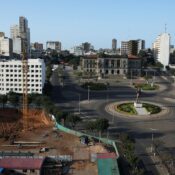
The government of Venezuela has announced that power is beginning to be restored following a nationwide blackout
The capital of Venezuela, Caracas, along with other areas of the country, encountered a blackout in the early hours of Friday. The government has stated that power is expected to be restored gradually. The government has attributed the blackout to sabotage by the opposition, although no evidence has been provided to support this claim.
President Nicolas Maduro, currently engaged in a dispute with the opposition regarding the results of the July 28 presidential election, frequently attributes disruptions in the power grid to his political rivals, a claim that the opposition consistently refutes.
The restoration of power is expected to commence shortly, starting with the capital city, as stated by Interior Minister Diosdado Cabello during an interview with state television at approximately 10 a.m. local time (1400 GMT). The minister reiterated the government’s assertion that the power outage was a result of an intentional attack.
The national distribution process will commence gradually, accompanied by the implementation of security protocols, as stated by Cabello.
The blackout also impacted several critical operations of state oil company PDVSA, including the largest oil terminal in the country, Jose. The outage caused disruptions to vessel loading and discharging, as reported by sources and a shipping document reviewed by Reuters.
Approximately 70% of Venezuela’s oil exports are managed through the Jose terminal, which lacks an independent power system.
According to sources, certain units of the El Palito refinery, which has a capacity of 146,000 barrels per day, were not operational. Additionally, the Caracas headquarters of PDVSA experienced a power outage.
The largest refining complex of the company, Paraguana, remained unaffected as its own power plant was operational, according to the sources.
The minister of communication and information, Freddy Nanez, reported on state television early in the morning that all 24 states in the country experienced either a complete or partial loss of electricity supply.
The individual stated that they are currently awaiting instructions from their supervisor regarding the possibility of leaving work if they are unable to continue working.
Alejandro Rondon, a 25-year-old bakery worker, reported that the card payment machine remained operational, allowing him to continue selling available products.
The production process is currently hindered due to the malfunctioning ovens, preventing us from manufacturing any products today. The individual expressed concern regarding the yeast, emphasizing the necessity for it to be kept at a low temperature.
The services on the city’s metro have been temporarily suspended and have been substituted by a fleet of over 250 buses, as stated by Transport Minister Ramon Velasquez.
An analysis of the election dispute will now be presented.
The government and opposition in Venezuela have both claimed victory in last month’s election. This claim is supported by the electoral authority and the Supreme Court, who have declared Maduro as the winner. The full vote tallies have not been released by the authorities, despite the international community’s urging to do so.
The number of arrests of opposition figures has experienced a significant increase in the past week.
Former opposition candidate Edmundo Gonzalez and opposition leader Maria Corina Machado are currently under investigation by Attorney General Tarek Saab for allegations of incitement and other criminal activities.
Gonzalez has failed to comply with two summonses to provide testimony regarding a website where the opposition has published what it claims to be over 80% of the vote counts from ballot boxes, indicating a decisive victory for Gonzalez.
A third citation was issued for Gonzalez on Friday, however, its validity during the blackout was uncertain. There was no immediate response from Saab to a text message requesting comment.
In 2019, Venezuela experienced a total of three nationwide power outages, with certain instances lasting up to a duration of three days. The power outages were attributed by authorities to attacks on the network, including damage to power lines, carried out by saboteurs and opponents of Maduro’s government.
Since assuming office in 2013, Maduro has overseen a significant decline in the country’s economy.
All Categories
Recent Posts
Tags
+13162306000
zoneyetu@yahoo.com


